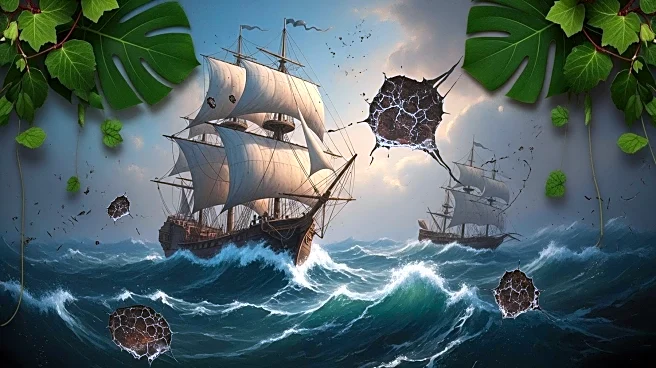What is the story about?
What's Happening?
On October 12, two activists from the climate group Futuro Vegetal were arrested in Madrid after defacing a painting of Christopher Columbus at the Naval Museum. The incident occurred on Spain's National Day, which commemorates Columbus's arrival in the Americas in 1492. The activists used biodegradable red paint to damage the left portion of José Garnelo's 1892 painting, 'First Tribute to Christopher Columbus,' and unfurled a banner stating 'October 12, nothing to celebrate. Ecosocial justice.' The protest aimed to draw attention to ongoing 'extractive neocolonialism' affecting Indigenous lands and resources. The activists were charged with crimes against cultural heritage and taken for questioning.
Why It's Important?
The protest underscores the contentious nature of Spain's National Day, which celebrates Columbus's expedition and subsequent European influence in the Americas. Critics argue that the holiday overlooks the negative impact of colonization, including the death and enslavement of millions of Indigenous people. The activists' actions highlight ongoing debates about historical narratives and the need for recognition of Indigenous rights and environmental justice. The incident also reflects broader global movements advocating for ecosocial justice and the reevaluation of colonial legacies.
What's Next?
The arrest of the activists may lead to further legal proceedings, potentially sparking additional protests or discussions about Spain's colonial history and its modern implications. Futuro Vegetal's call for boycotts of companies involved in extractive projects could gain traction, influencing public opinion and corporate practices. The event may also prompt museums and cultural institutions to reassess how they present historical figures and events, considering the perspectives of marginalized communities.
Beyond the Headlines
The protest at the Naval Museum is part of a larger pattern of activism challenging historical narratives and advocating for Indigenous rights. Similar actions, such as the sit-in by Marea Palestina at the Reina Sofía Museum, indicate a growing trend of using cultural spaces to highlight social and political issues. These movements may lead to increased dialogue about the ethical responsibilities of cultural institutions and the importance of inclusive historical representation.
















